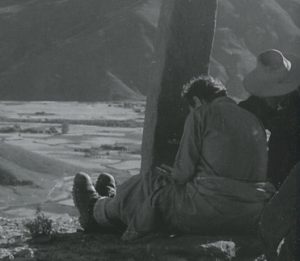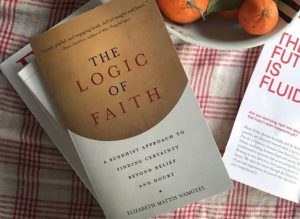Shambhala Publications published The Intimate Way of Zen by James Ishmael Ford in July 2024.
Ford is a multifaceted spiritual leader and author with a background in various spiritual traditions, having studied with Sufis and Christian mystics, and having lived in Buddhist monasteries, giving him interesting interdisciplinary insights. In fact, he is both an ordained Zen priest and a Unitarian Universalist minister, but is possibly best known for his work in Zen Buddhism—especially within the Harada-Yasutani lineage. His previously published books including Zen Master WHO? and If You’re Lucky, Your Heart Will Break.
In this, his most recent literary offering, Ford leads us through the 10 ox-herding tales of Zen wisdom, exploring the overlaps, history, and occasional differences with Christianity, Greek mythology, and modern life. Sometimes he’s telling us about himself and his experiences and sometimes he’s talking to us—really talking to us—and sometimes we’re exploring together. And sometimes we’re listening to history, a lesson, or a wonderful story, and sometimes we’re in deep contemplation over a koan.
Koans and their incomplete nature, their “feedback loop of heaven and earth” and letting the “koan breathe you” reminds me of a subject that I study and write on with great fascination: the brain. As the noted US neuroscientist Vilayanur S. Ramachandran has noted, the brain loves to solve a puzzle. That moment of realization “excites certain neurons, sending information to the limbic system, into the sympathetic nervous system that we then experience as an emotional response. A response the limbic system remembers.” When the koan reveals itself, our brain experiences a moment of euphoria and our entire body wakes up. However, we also have Bible verses and psalms, poems and philosophies through which we can enjoy the interconnected nature of our deep practice of embracing the ox.
The book follows a sweet format: “Before the full moon” and “After the full moon” as we progress on this journey, with each ox-story chapter arching over two or three short chapters to help bring it to life.
For those unfamiliar with Ford and his overlapping religious work, on picking up a book on Zen from the bookshelf one may be surprised to be met with his Christianity. As they say, aren’t we supposed to “hold on to the tail of only one ox to lead us home?” Yet they also say “1,000 monks, 1,000 religions.”
It may be that for far too long humans have held on to the tail of one ox and claimed it as the only way, even killing others in the process. The blinkered zealots of any religion cease questioning, and this is clearly an unhealthy path. So it was a delight to read how Ford embraces aspects of more than one religion that feels right to him—after all, the esoteric nuclei of most religions are pretty similar anyway, especially when it comes to personal conduct. My own combination of those factors is of deep history, spirituality, and science, although we know how well that has gone down in history.
With this in mind and with Ford’s touching on precepts and reflecting on the vows one takes when entering a religious path, I was reminded of the 42 Confessions of Ma’at, which were first documented around 1250 BCE, during Egypt’s 19th dynasty, in the Papyrus of Ani, part of the Egyptian Book of the Dead. They were also known as the Negative Confessions or the Declaration of Innocence, and were a series of statements in which the deceased declared their innocence of various sins and wrongdoings before the gods in the afterlife. These confessions were intended to show their moral purity and to ensure that they were accepted into the afterlife. It really had me thinking about the prayers and vows we make in life, but also how quickly we break them, from New Year resolutions to honesty. However, looking at the state of the world in the name of religion, how many vowed not to take a life but have then morphed that vow to suit their own ends?
While I agree that we want to attain wisdom and compassion during our life, I can see how the ancient Egyptian vows easily morphed into a Christian concept of heaven versus the hell realms. However, I have my own thoughts on Ammut’s devouring of the heart, which has more to do with reincarnation and rebirth. But I digress.
Fortunately, within the pages of Ford’s book, he offers us some really practical advice on how to practice things such as our vows in our everyday life.
I adore all the cross-cultural references and figures from outside of religion, many of whom I greatly admire. However, in the context of loving-kindness, I think a couple of questionable and avoidable examples were used, albeit briefly, given the controversy surrounding them. And unfortunately, I am reading this book after a year of atrocities in Gaza. Readers may wish to be aware, and some of his words may feel a tad jarring in the moment.
I was also initially irritated by the inclusion of one reflection: “The current feminist critique of the Siddhartha Gautama’s abandonment of his wife and child . . .” Maybe I am blinded by my womanhood, but I don’t think that this should simply be a feminist issue and only brought up by women. With many elements of Buddhism open to evolution, stepping out of the patriarchal culture prevalent in ancient India should be a no-brainer. Irrelevant of all today’s talk of “the rise of the divine feminine,” why are the females of this human species still a voice fighting to be heard? And when it is mentioned, it is labelled as feminist rather than simply human. A sentient being. Needless to say, our author navigates this issue pretty thoughtfully as he continues offering us food for consideration.
All in all, I really did enjoy this book. Its delivery was warm, educated, and well-rounded, as one would expect from an author who has lived a varied life. Its breakdown of how to understand this journey of the ox and how to implement it in our lives is beautifully laid out and easy to follow. At times it even felt like a cafe conversation with a wise friend. I liked that. Very much.
See more
The Intimate Way of Zen (Shambala Publications)
Related features from BDG
Book Review: A Meditator’s Guide To Buddhism by Cortland Dahl
Book Review: From Foundation to Summit by Orgyen Chowang
Book Review: This Fresh Existence – Heart Teachings from Bhikkhuni Dhammananda














